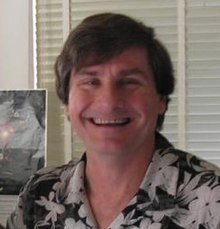Alex Filippenko | |
|---|---|
 | |
| Born | Alexei Vladimir Filippenko July 25, 1958 Oakland, California, U.S. |
| Education | University of California, Santa Barbara (B.A. 1979) California Institute of Technology (Ph.D. 1984) |
| Known for | Studies of supernovae, active galaxies, black holes, accelerating expansion of the Universe |
| Spouse | Noelle Filippenko |
| Children | 4 |
| Awards | Newton Lacy Pierce Prize in Astronomy Guggenheim Fellowship Gruber Prize in Cosmology Breakthrough Prize in Fundamental Physics Carnegie/CASE National Professor of the Year Richard H. Emmons Award Robert M. Petrie Prize Richtmyer Memorial Award Carl Sagan Prize for Science Popularization |
| Scientific career | |
| Fields | Astrophysics |
| Institutions | University of California, Berkeley |
| Thesis | Physical conditions in low-luminosity active galactic nuclei (1984) |
| Doctoral advisor | Wallace L. W. Sargent |
| Other academic advisors | Stanton J. Peale[1] Hyron Spinrad |
Alexei Vladimir "Alex" Filippenko (/fɪlɪˈpɛnkoʊ/; born July 25, 1958) is an American astrophysicist and professor of astronomy at the University of California, Berkeley. Filippenko graduated from Dos Pueblos High School in Goleta, California. He received a Bachelor of Arts in physics from the University of California, Santa Barbara in 1979 and a Ph.D. in astronomy from the California Institute of Technology in 1984, where he was a Hertz Foundation Fellow. He was a postdoctoral Miller Fellow at Berkeley from 1984 to 1986 and was appointed to Berkeley's faculty in 1986. In 1996 and 2005, he was a Miller Research Professor, and he is currently a Senior Miller Fellow. His research focuses on supernovae and active galaxies at optical, ultraviolet, and near-infrared wavelengths, as well as on black holes, gamma-ray bursts, and the expansion of the Universe.
- ^ "Alex Filippenko - Acceptance Speech". U.S. Professors of the Year. Archived from the original on October 31, 2014. Retrieved April 4, 2015.